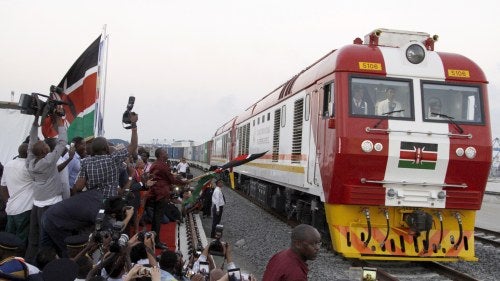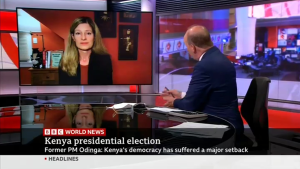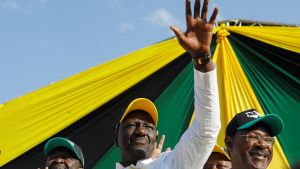Kenyan Views on Global Actors Shed Light on Nation's Economic Ties

A plurality of Kenyans express somewhat or very positive opinions about the economic influences of outside state actors in their country.
Afrobarometer recently released its latest survey of Kenyan populations, which was fielded April 10-May 3, 2024. These findings come at a time when Kenya has been pursuing an ever-increasing role in both Africa and on the global stage, fueled by a focus on technological advancement. In the aftermath of last summer’s protests in response to Kenyan President William Ruto’s proposed tax increases to pay off Chinese debt, understanding Kenyans’ views toward various actors—especially those investing in the country’s push for a startup economy—remains more critical than ever.
The newly released Afrobarometer poll finds that Kenyans’ views on other states and organizations remains generally positive toward all, with a plurality of Kenyans being somewhat or very positive about various states’ economic influences in Kenya.
Russia remains the exception, with respondents much more split on whether it positively or negatively influences Kenya. This may be reflective of Russia’s invasion of Ukraine, which threatened Kenyan grain imports from Russia and Ukraine alike, both of whom are major Kenyan trade partners. Despite this, and despite the United States naming Kenya a major non-NATO ally earlier this year, Nairobi has had a policy of strategic ambiguity in the Russia-Ukraine war. That approach is popular with Kenyans: 64 percent of Kenyans prefer neutrality between Ukraine and Russia, with relatively few wanting to side with Kyiv (8%) or Moscow (5%).
Public support for regional and continental organizations remains strong, with three-fifths of Kenyans viewing the influence of the East African Community (EAC) and the African Union (AU) as positive for Kenya (62% and 57%, respectively). Similar percentages also say that Kenya’s needs and interests are adequately recognized by both organizations (EAC: 55%; AU: 57%). Kenya’s role in the EAC as a member of the “Coalition of the Willing”—a political bloc within the EAC composed of Rwanda and Uganda alongside Kenya—underscores its importance in the regional organization, and broad support for the EAC reveals Kenyans’ interest in maintaining good relations with their regional partners.
Additionally, as Kenya looks to take a more active role in the world and expands its technological sector, it may also have to contend with the US-China rivalry in Africa—despite polling showing that Kenyans prefer favorable relations with both. The United States has found opportunities to invest in the country’s technology amidst drops in investment by China. However, Washington may face a financial challenge in countering Beijing’s growing economic role in Kenya. Nairobi owes approximately $8 billion to Beijing—just under 10 percent of its total debt ($82 billion)—and has relied on Chinese investment for its infrastructure initiatives.
As violent protests opposing Ruto’s proposal of $2.7 billion in new taxes have forced him to withdraw this plan, Kenya will have to find a new way to pay off its debt. While making a new fiscal plan, Ruto will need to balance Nairobi’s relations with Washington and Beijing and the demands of the Kenyan public.




Related Content
 Global Politics
Global Politics
Elizabeth Shackleford looks at William Ruto's win in Kenya's presidential election and why it's a good sign for Kenyan democracy.
 Global Politics
Global Politics
"Kenyan elections have a troubled history, but with democracy declining across the globe, Kenya this year stands out as a possible ray of hope," writes Elizabeth Shackelford.
